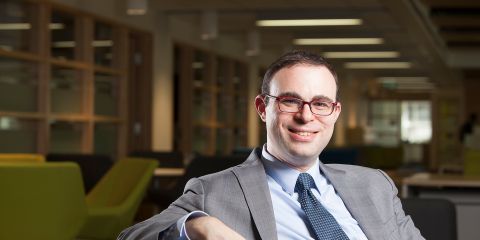
Professor Joshua Karton, appointed Associate Dean of Graduate Studies and Research on July 1, brings outstanding credentials to his new post. He came to Queen’s after earning a JD from Columbia and a PhD in international law from Cambridge, and practising at a leading New York firm. An expert on international commercial law and dispute resolution, Karton uses a variety of research methods from theoretical to quantitative and has published for a wide range of audiences. He has written practical articles for lawyers to apply directly in their work, theoretical inquiries aimed at academics, policy-oriented reports intended for governments and NGOs, non-technical writing for the general public, and is now working on a guidebook on international arbitration law for Canadian judges.
One week into his new dual role, Associate Dean Karton shared with Queen’s Law Reports his plans for grad studies and research.
QLR: What interested you in the Associate Dean position?
JK: Partly I felt that, now that I’m tenured, I have a duty to help in the running of the Faculty and I didn’t want to just serve on yet another committee. This was the administrative post that most interested me. I’ve long had a personal interest in graduate education, and enjoy working one-on-one with more mature students on large-scale, intensive projects. When I agreed to take on the position, I was most focused on the graduate studies part of the portfolio. But as I’ve been getting up to speed on the job, the opportunity to help build and promote Queen’s Law as a research community – not just as a collection of researchers – intrigues and inspires me.
QLR: Which aspects of your research role do you look forward to most?
JK: The research portfolio is an odd kind of job; aside from the purely administrative aspects, it’s part cheerleader, part public relations flack. My first job is to help my brilliant colleagues do what they do best: produce original, thought-provoking, and agenda-defining research. The second is to help get that research out to the people who can appreciate and use it, whether they are students or academics, lawyers or judges, activists or policy-makers, specialists or the general public. What I’m looking forward to most is getting to know more about the research that the Law Faculty produces. I’ll frankly admit that, with a few exceptions, I don’t actually know much about what my colleagues do in their research. As the Associate Dean, I’ll get a ringside seat to watch their research agendas unfold.
QLR: What do you look forward to in your graduate studies role?
JK: Again, for me it’s mostly about getting to know and work with the people. Last year, I started teaching the seminar on legal research methods that’s required for new LLM and PhD students; I really enjoyed becoming familiar with the whole class of incoming graduate students and watching them start to blossom as researchers. As Associate Dean for Graduate Studies, I will be partly responsible for these students’ progress on their theses, their mental health, their career prospects, and the like. It’s a burden I’ll happily shoulder, because I know first-hand how great the students in our LLM and PhD programs are.
QLR: What are your top priorities for research at the Faculty?
JK: Something I’d like to improve is a sense of common purpose on the research side. We have a lot of great individuals, but we’re not yet really a team. I have various ambitions for the Faculty’s research progress that can be measured in terms of “metrics” – grants won, citation counts, professorships endowed, etc. – but my biggest priority is to help build that sense of common purpose and increase collaboration within the Faculty. I’d love to see us all more engaged in each other’s research, because I know that the biggest secret weapon that a researcher can have is the extensive support and feedback of their colleagues.
QLR: What are your goals for LLM and PhD studies?
JK: Like on the research side, I have some of the standard kinds of goals for the LLM and PhD programs, such as increasing external scholarship funding, strengthening links with universities outside Canada, and securing great jobs for our graduates. One thing that’s important to remember is that people do LLMs and PhDs for a variety of reasons and at different stages in their lives and careers, so it’s vital to have a program that, while small, can still serve these various kinds of students.
Once again, though, my biggest priority can be captioned in terms of “community.” It’s a simple fact that a university department cannot be great without a great graduate program. That doesn’t just mean smart students writing good theses, but also a community of ambitious and energetic new researchers who support each other and are fully integrated into the broader research mission of the Faculty. Our graduate program has always been small, and for too long our LLM and PhD students have been a bit of an afterthought. I’m trying to change that. For example, I’ve been putting together a new orientation program that will begin on the first day of school in September and continue throughout the year, integrated with a graduate student works-in-progress colloquium. This will help new graduate students get to know the upper-year students and members of our faculty other than their supervisors. The more we treat our LLM and PhD students like members of the Faculty, not just “consumers” of our teaching services, the happier, healthier, and the more successful they will be and the more the graduate program will benefit Queen’s Law in the future.